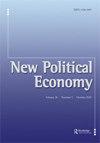这是一个关于房地产周期和财政政策的故事,而不是竞争力。南欧的增长动力
IF 3.8
2区 经济学
Q1 ECONOMICS
引用次数: 0
摘要
南欧国家被广泛认为是一种独特的资本主义类型,但它们经历了不同时期和不同国家的不同增长表现。本文研究了20世纪90年代中期以来南欧的增长动力。我们从地中海资本主义和比较政治经济学的文献中更广泛地考虑了一系列潜在的增长动力。在需求方面,这些因素包括房价的作用(作为主要的金融变量;在部分增长模型方法中突出显示);“金融诅咒”假说(假定资金流入导致房价飙升并挤占制造业活动);以及关于财政政策影响的凯恩斯主义观点。在供给方面,这些包括成本竞争力论点(与主流经济学和资本主义多样性方法一致),以研究为主导的技术变革;以及关于生产能力的新结构主义观点。我们发现了房价和财政政策对经济增长贡献的有力证据。虽然这些发现总体上支持现有的分析,即这些经济体是金融主导的,而不是出口主导的,但它们呼吁在增长模型分析中更认真地整合房价,并对财政政策的增长影响进行更系统的分析。本文章由计算机程序翻译,如有差异,请以英文原文为准。
A tale of housing cycles and fiscal policy, not competitiveness. Growth drivers in Southern Europe
ABSTRACT Southern European countries are widely considered a distinct type of capitalism, but they have experienced a varied growth performance, both over time and across countries. This paper investigates the growth drivers in southern Europe since the mid-1990s. We consider a broad set of potential growth drivers derived from the literature on Mediterranean capitalism and Comparative Political Economy more broadly. On the demand side, these include the role of house prices (as the main financial variable; highlighted in parts of the growth models approach); the ‘financial curse’ hypothesis (which posits that financial inflows caused house price booms and crowded out manufacturing activities); and Keynesian arguments on the impact of fiscal policy. On the supply side, these encompass the cost competitiveness argument (consistent with mainstream economics and the Varieties of Capitalism approach), research-led technological change; and neo-structuralist arguments regarding the productive capacity. We find strong evidence for the growth contributions of house prices and fiscal policy. While these findings are generally supportive of extant analysis of these economies as finance-led rather than export-led, they call for a more serious integration of house prices in growth model analysis and for a more systematic analysis of the growth impact of fiscal policy.
求助全文
通过发布文献求助,成功后即可免费获取论文全文。
去求助
来源期刊

New Political Economy
Multiple-
CiteScore
10.10
自引率
9.50%
发文量
41
期刊介绍:
New Political Economy aims to create a forum for work which combines the breadth of vision which characterised the classical political economy of the nineteenth century with the analytical advances of twentieth century social science. It seeks to represent the terrain of political economy scholarship across different disciplines, emphasising original and innovative work which explores new approaches and methodologies, and addresses core debates and issues of historical and contemporary relevance.
 求助内容:
求助内容: 应助结果提醒方式:
应助结果提醒方式:


